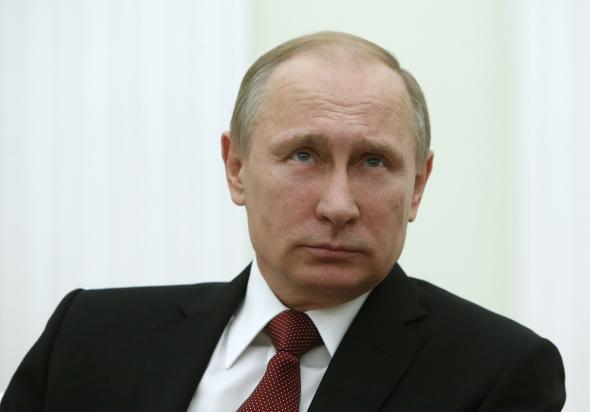In a forthcoming Russian television documentary, President Vladimir Putin states for the first time that plans were in the works to reabsorb Crimea into Russia weeks before a referendum on the issue was held.
As reported by the BBC, Putin tells the interviewer that an all-night meeting with his senior officials was held on Feb. 22, 2014, to plan the rescue of Ukraine’s pro-Russian President Viktor Yanukovych, who had just fled Kiev after weeks of protest.
Putin says, “We finished about seven in the morning. When we were parting, I told all my colleagues, ‘We are forced to begin the work to bring Crimea back into Russia.’ ”
Five days later armed militants—including some wearing what appeared to be Russian military uniforms without insignia—seized government buildings in Crimea, paving the way for a controversial referendum and the Russian government’s reabsorption of the region in March. (Most of the international community has not recognized the merger.)
Putin’s explanation of what exactly happened in Crimea has been continuously evolving. In March 2014, for instance, he denied that Russian forces had played a role in seizing power in the peninsula, saying that the gunmen had been “local self-defense units.” When asked about the presence of the “little green men,” who wore what appeared to be Russian military uniforms, he said, “You can go to a store and buy any kind of uniform.”
The following month, Putin maintained that the annexation wasn’t planned and that the decision to absorb Crimea was made only after the buildings were seized, when a secret poll of Crimeans was held and “the mood of the people became clear.”
Last November, however, he told a Russian TV interviewer, “Our armed forces, let’s be frank, blocked Ukraine’s armed forces that were stationed in Crimea.” This was done, he said, “to prevent bloodshed, and to allow people to express their personal views on how they would like to see their own and their children’s future.”
Putin’s latest amendment to the story line comes a couple of weeks after an opposition newspaper published a memo allegedly sent by the ultraconservative financier Konstantin Malofeev to the Kremlin shortly before the fall of Yanukovych, advocating a strategy for Ukraine including the annexation of Crimea.
Putin’s latest statement would appear to confirm the main implication of the Malofeeev memo: that the Russian government had planned to take advantage of the chaos following Yanukovych’s ouster to seize Crimea. Putin has cast the reabsorbtion of the territory as the righting of a grave historical injustice—and his latest story line has the advantage of giving him credit for the idea.
